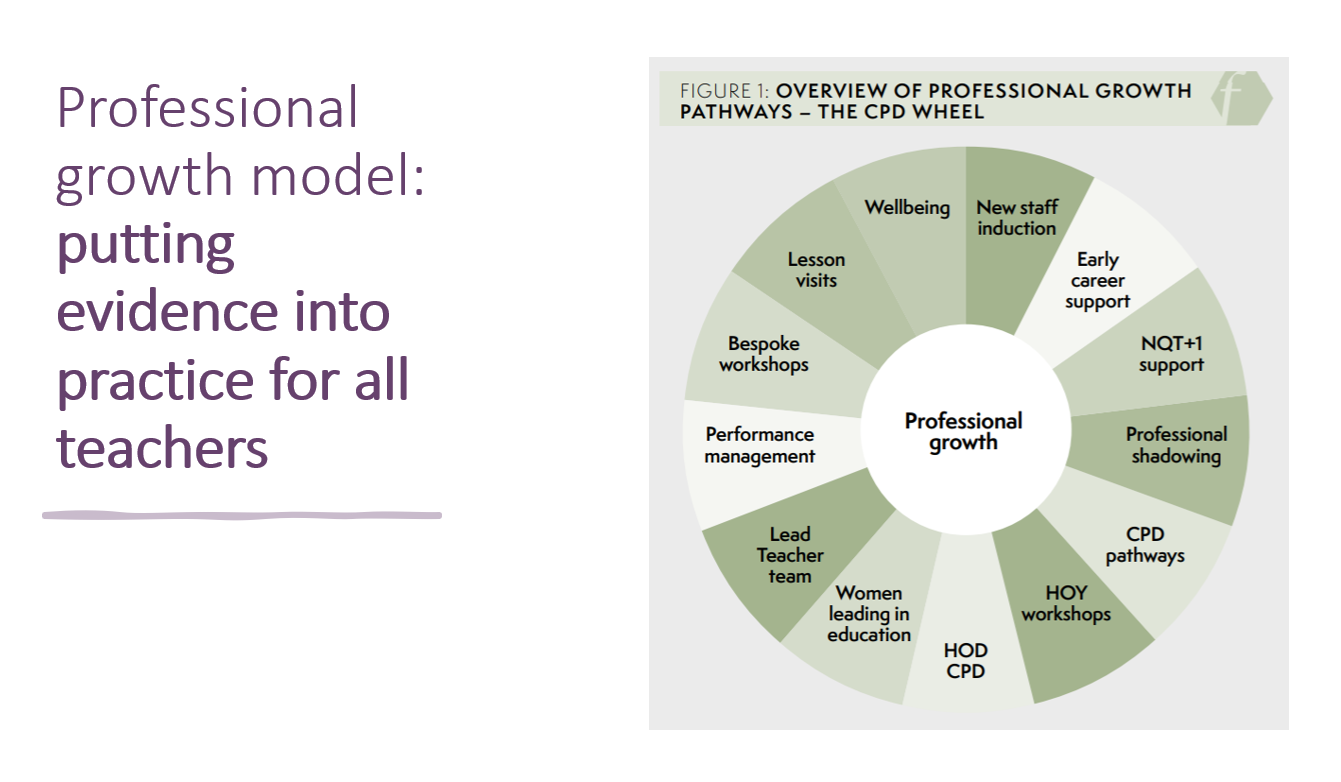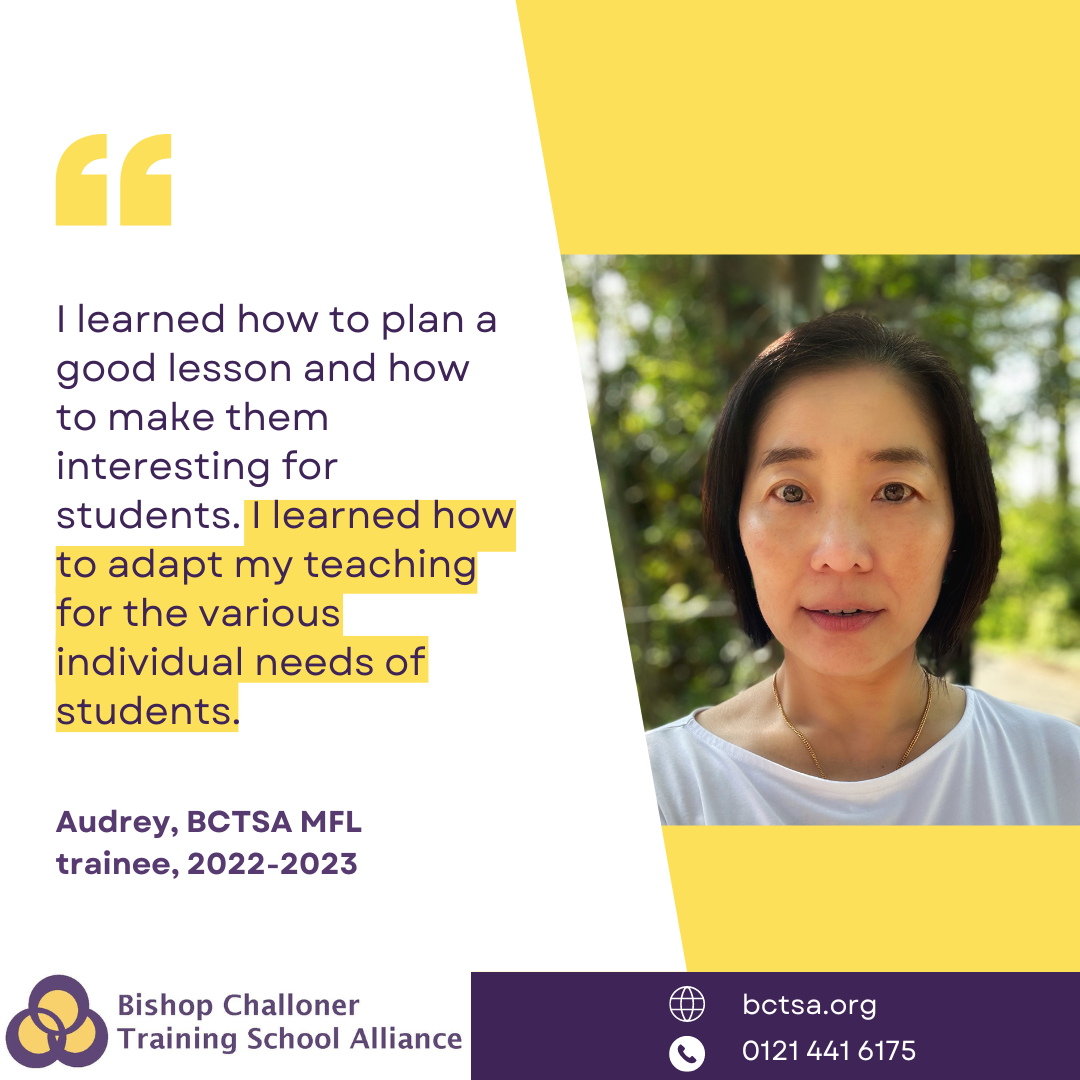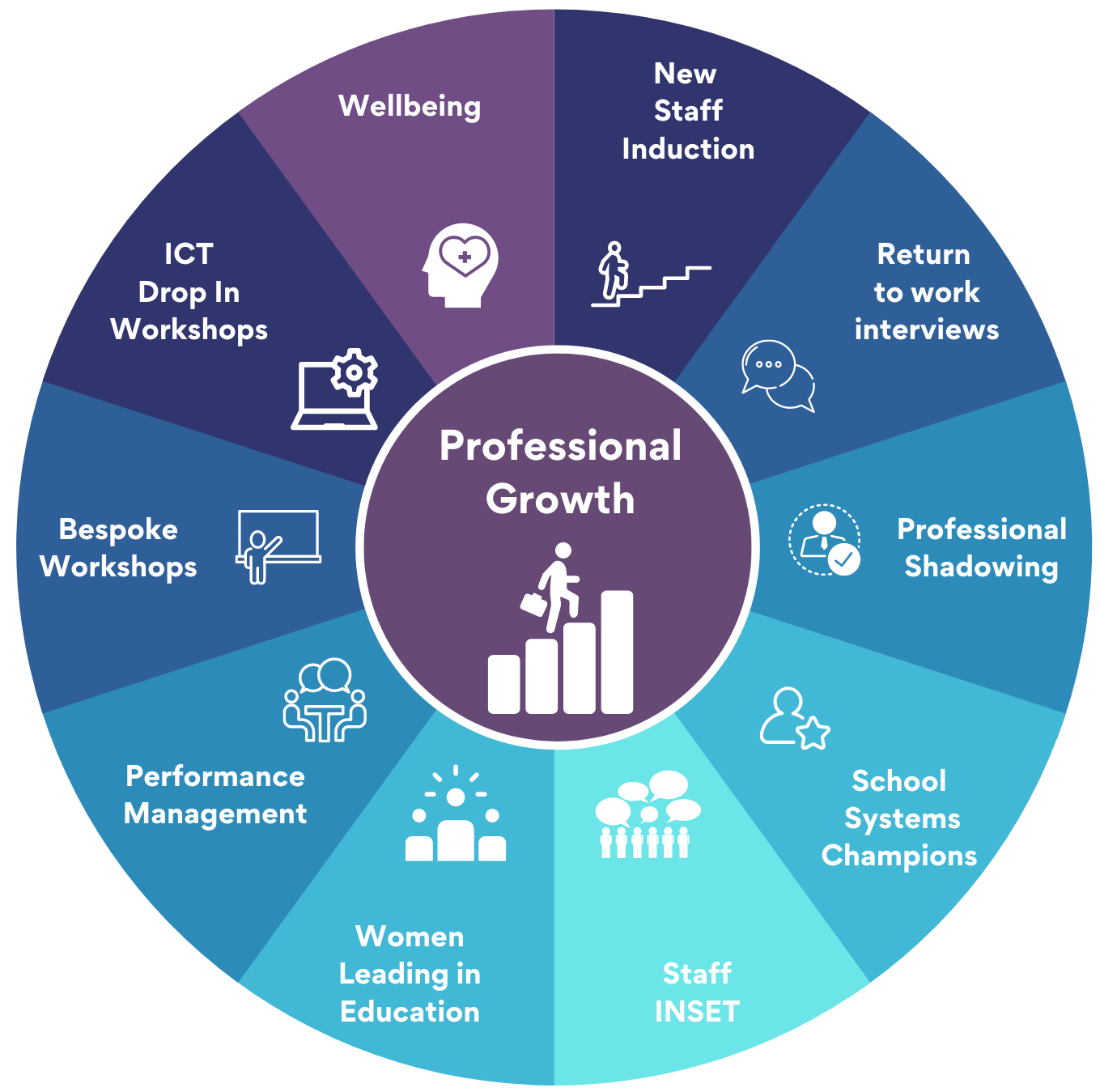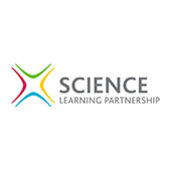We are justifiably proud of our Professional Growth model for both teachers and support staff. Our teacher-focussed model was recently the focus of an article in the Chartered College of Teaching Impact magazine (read here https://my.chartered.college/impact_article/empowering-cpd-building-a-strong-professional-growth-model-for-teachers/ ), but the core of our approach is to offer a ‘wheel of CPD’ to both teachers and support staff. We update this regularly, but here staff can see the full offer available to them, and pick options for development which are well fitted for their needs:

Our Professional Growth framework uses Performance Management as a tool to help staff engage with these many opportunities in strategic way, using coaching conversations to support teachers formulate a 5 or even 10 year career plan, mapping the support available, and making sure individual teachers tap into the best CPD for their personal career goals.

We are a SCITT, offering teacher training with a full range of programmes and subjects on offer. Our trainees use words like ‘welcoming’, ‘caring’ and ‘supportive’ again and again in their evaluations, and this really sums up our ethos: the wonderful team are here to support everyone, from those straight out of Uni to career changers, to excel in joining this brilliant profession.
Train to teach with Bishop Challoner SCITT


For Early Career Teachers, we deliver the Best Practice Network programme, which has provided some exceptional development for registered ECTs. Delivered by teachers and facilitators from Bishop Challoner Catholic College, but with mentoring support to help ECTs apply learning in their own context, this programme is designed to help all ECTs build strong foundations for a teaching career we hope will last many years.
Working with trainees and ECTs, of course mentoring is at the core of our practice. We believe that to mentor is great CPD for the mentor as well as the mentee, and we invest time and support in empowering mentors to excel in their crucial roles.
Early Career Teachers and mentor – development programme with Best Practice Network
For staff beyond their ECT years, our Professional Growth model sets out the full (ever-growing) menu of CPD and development opportunities, both internal and external. Nothing stands still at Bishop Challoner Catholic College, and before you have been with us long, you are likely to be both engaging with, facilitating, or even leading CPD to develop for others, taking your expertise and using it to support other developing teachers.
In joining Bishop Challoner, you are not just joining a lone school. As Bishop Challoner Training School Alliance, we have achieved designations including SCITT provider, Training School, Computing Hub, Maths Hub, Microsoft Showcase School and Science Learning Partnership which involve staff delivering CPD opportunities for colleagues across the region – and indeed nationally. We are at the heart of the development and delivery of programmes to support non-specialist teachers in physics, maths and MFL and we work in partnership with the Royal Society to develop STEM projects and resources that benefit pupils across multiple schools, including our own. As a school, we are at the cutting edge of national educational developments. To join Bishop Challoner is not just to join a school with great CPD, but to join a community with a mission to support great CPD to thousands of other schools and teachers across England.
We have included links to our various designations so that you can explore the opportunities that are available to you. Many of these are free, with funding available for some projects.
Designations
At Bishop Challoner, all Support Staff are supported to grow and develop in their career. Alongside the model for teachers, Our Professional Growth framework for Support Staff uses Performance Management as a tool to support colleagues to develop their own career goals and personal development.
Bespoke workshops and drop-in sessions are run throughout the year, facilitated by internal and external groups. Our whole staff INSET and wellbeing initiatives are developed with key members of the Support Staff team to ensure that all staff at Bishop Challoner Catholic College are supported and have the necessary tools to explore and lead their own professional development.

Reading Disciplinary Literacy
At Bishop Challoner, a priority for staff CPD in Teaching and Learning has been Literacy and Reading around the curriculum. Our CPD always begins from a starting point of why we should prioritise Literacy in all our lessons.
We start from a point of social injustice. As Geoff Barton noted in The Oxford Language Report – Why Reading matters - “In reality the word gap will depend upon your circumstances rather than your choices – your home, your family, the richness of language and relationships, the presence of books and conversations, the habits you form as you grow up. These are things largely beyond our control.”
Research around the Literacy ‘Matthew Effect’ suggests that this gap just gets wider. Students who have lots of experience of reading in their early lives become more fluent, can comprehend texts confidently and build an increasingly sophisticated repertoire of vocabulary.
In contrast, children who have limited exposure to reading find it harder to achieve fluency and comprehension, and are significantly word-poorer than their peers. Following the pandemic, in 2020 we made this a significant whole school priority because, as Alex Quigley questioned ‘Given disadvantaged pupils are less likely to own a book than their advantaged peers, how can we expect their reading development flourished during lockdown?’
Our teaching and learning focus began on establishing Reading as a priority across the whole school. Inspired by Mary Myatt, we explored how cognitive science suggests our brains prioritise narrative and we are more likely to retain information if it is told to us in a story. We know that reading stories allows us to get a sense of the bigger picture and can make complex ideas more accessible. Mary Myatt argues that we are not providing enough reading opportunities of challenging texts within our curriculum.
We allowed Departments time to consider how they could build more reading into their lessons. However, we wanted to ensure that their experience of reading in lessons was uniform across the school.
Research tells us that a lack of prior knowledge is a huge barrier to student’ comprehension. We introduced the K.A.L.E acronym, asking teachers to plan to read in advance considering what student might need to Know, Ask, Learn and Explore before we begin reading a text.
We also placed emphasis on the importance of conscious vocabulary instruction, allowing every reading opportunity to be an opportunity for students to develop their ability to express themselves in a sophisticated way. Our Mine, Shine, Bank and Bling strategy allows teacher to pre-plan what Tier 2 vocabulary (Beck et al) they could teach while reading in lessons.
We also developed a whole school approach to homework, ensuring that once a half term, all students could read challenging texts within their subject areas, accessing the ‘best of what best that has been written and thought about in our subjects’.
Developing these whole school approaches to literacy have been an important part of teaching and learning in our school, but we know, following the EEF’s guidance in 2019 that the most effective literacy instruction combines these whole school approaches with subject specific approaches to support students to develop their literacy. Departments have used guided inset time and Department time to identify how we read, write and speak like an expert within their subject.
Through a variety of planned inset and delivery of these strategies, teachers in every discipline at Bishop Challoner recognise and support their vital role in supporting all students in their literacy and to strive to address some of the injustice in our society.
Ali Marsh – Associate Principal Bishop Challoner Catholic College.
September 2023
Further reaading
Beck, I (2013) Bringing Words to Life, Guildford Press,
Cain, C (2018) Why Closing the Word Gap matters – Oxford Language Report
Myatt, M (2021) https://www.marymyatt.com/blog/text-as-the-beating-heart-of-the-lesson
Quigley A (2020) Covid 19 and The Literacy Matthew Effect



